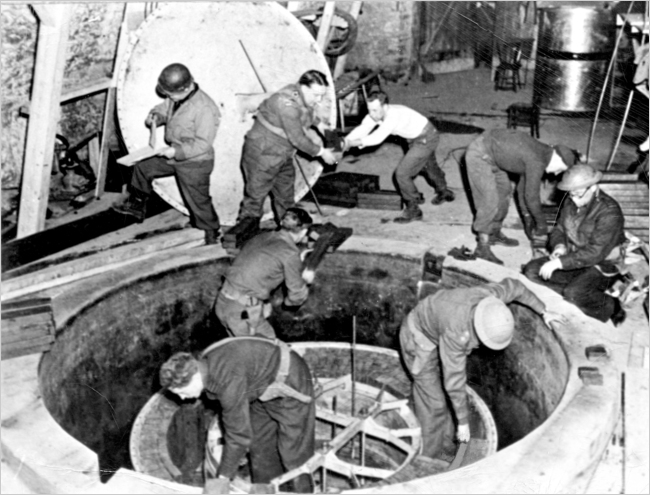In a fascinating article, historian Dr. Alex Wellerstein explores When did the Allies know there wasn’t a German bomb?
By the end of 1942, the Germans had decided that a bomb project was unlikely to succeed. They continued to conduct research, but never organized the program into a large industrial one like the Manhattan Project. But with Nobel Prize winner Werner Heisenberg working for the Nazis, Manhattan Project scientists and leaders continued to fear that Germany would succeed in building an atomic bomb. General Groves ordered a counterintelligence operation, the Alsos Mission, to determine how far the Germans had progressed in developing the bomb.
By November 1944, Samuel Goudsmit, head of the Alsos Mission, had determined that “Germany had no atom bomb and was not likely to have one in a reasonable time.” The final confirmation that Germany never came close to building a bomb came when the Alsos Mission captured the Nazis’ nuclear sites and scientists at the end of the war.
As Wellerstein explains, “The degree to which the goals of the atomic bomb program shifted – from building a deterrent to building a first-strike weapon – is something often lost in many historical descriptions of the work. It makes the early enthusiasm and later opposition of some of the scientists (such as Leo Szilard) seem like a change of heart, when in reality it was the goals of the project that had shifted. It is, in part, a narrative about the shifting of perspective from Germany to Japan. Like the Allied knowledge of the German program, it was not an abrupt shift, but a gradual one.”
During the war, the Allies actively tried to disrupt Germany’s nuclear program. In this riveting account, Joachim Ronneberg recalls being part of the mission that blew up the Norsk Hydro plant, which supplied heavy water to Germany. The New York Times explains that “Mr. Ronneberg’s raid slowed the Nazi’s pursuit of a bomb rather than delivering a knockout blow,” but it contributed to the Allies’ increasing confidence that Germany would fail in its bomb program.





